Tuesday, June 06 2017
 My newest book and first historical romance has just been released on all e-book platforms. It’s a time travel romance, set during the beginnings of the American War for Independence and several people along the way to getting it published have asked me what inspired me to write this particular book. So here’s the answer to that query. My newest book and first historical romance has just been released on all e-book platforms. It’s a time travel romance, set during the beginnings of the American War for Independence and several people along the way to getting it published have asked me what inspired me to write this particular book. So here’s the answer to that query.
Back when I lived on the Maine coast, I came across a book by Bill Caldwell, The Islands of Maine, Where America Really Began. It was a fascinating book about the earliest European settlers in New England. From my front yard I could see one of those islands mentioned in Mr. Caldwell’s book. Historian Charles K. Bolton also wrote of this island in his book, The Real Founders of New England, noting that four hundred years ago, “Here was the chief maritime port of New England. Here was the rendezvous for English, French and Dutch ships crossing the Atlantic. Here men bartered with one another and with Indians, drank, gambled, quarreled and sold indentured servants.” Four hundred of years ago, two hundred years before the Pilgrims arrived in Plymouth on the Mayflower there were “wharves, salting houses (for fish) sheds, boatyards, taverns and perhaps a bawdy house or two for sailors coming ashore after a long Atlantic Crossing” clustered on this tiny island called Damariscove.
Edward Winslow, the Pilgrim representative who came begging for supplies in 1622, wrote in his journal that he and his group were graciously welcomed with “Kind entertainment and good respect and a willingness to supply our needs . . . and that there were 30 ships of sail anchored in the harbor.” Damariscove Island is only two miles long and not more than a quarter mile wide, yet, in 1675 three hundred refugees fleeing Indian wrath sheltered here. A century later, just before the start of the Revolutionary War a British Naval captain put ashore here and stole 75 sheep to feed his sailors before turning south to burn present day Portland to the ground.
 During the war of 1812 (the Second War of Independence) the HMS Boxer and the USS Enterprise fought a famous sea battle so close to the island that the inhabitants of Damariscove watched the fight from their own shore. (Just another bit of interesting history, the captain of HMS Boxer, Samuel Blyth who was just 29 years old, and the American Lieutenant William Burrows age 28 who captained the USS Enterprise were both killed in the battle and were buried side by side in a cemetery in Portland, Maine with full military honors.) During the war of 1812 (the Second War of Independence) the HMS Boxer and the USS Enterprise fought a famous sea battle so close to the island that the inhabitants of Damariscove watched the fight from their own shore. (Just another bit of interesting history, the captain of HMS Boxer, Samuel Blyth who was just 29 years old, and the American Lieutenant William Burrows age 28 who captained the USS Enterprise were both killed in the battle and were buried side by side in a cemetery in Portland, Maine with full military honors.)
Is it any wonder that I was fascinated with this scrap of land I could see from my front yard? So one day, my dad, my daughter and I sailed out to Damariscove one glorious summer day to explore. As I stood gazing down at the narrow harbor Winslow’s words came back to me, and I marveled that 30 sailing ships big enough to cross the Atlantic could have fit in that long gut of bright blue water. There were, just as Bill Caldwell had described, many old granite foundations scattered on the high ground above the harbor and as I stood on the cornerstone of one of the largest foundations, I tried to imagine this island full of people and what life might have been like here in an era when brave young captains ventured forth to harass the British Navy or carry ships filled with salted cod and furs across the Atlantic to Europe. There were tales of a ghost who roamed the island with his faithful dog, but of course there was no sign of him. Or any of the other souls who had called this place home for hundreds of years.
 Then the rock beneath my feet wobbled. I jumped back alarmed, not wanting to tumble into the long abandoned cellar hole. But as I watched a small shower of loose gravel and dirt tumble into the daisy-lined hole the seemingly random thought came to me, “What if I fell in, hit my head and was knocked unconscious, but when I came to my senses again there were sturdy floor joists over my head and a door enclosing me in a basement filled with the sorts of things kept in basements a long time ago?” As we climbed back in our dinghy and headed back to the sailboat, that question continued to rattle around in my head and that was the beginning of my story, Iain’s Plaid. I hope you enjoy reading it as much as I enjoyed imagining it and committing that tale to paper. Then the rock beneath my feet wobbled. I jumped back alarmed, not wanting to tumble into the long abandoned cellar hole. But as I watched a small shower of loose gravel and dirt tumble into the daisy-lined hole the seemingly random thought came to me, “What if I fell in, hit my head and was knocked unconscious, but when I came to my senses again there were sturdy floor joists over my head and a door enclosing me in a basement filled with the sorts of things kept in basements a long time ago?” As we climbed back in our dinghy and headed back to the sailboat, that question continued to rattle around in my head and that was the beginning of my story, Iain’s Plaid. I hope you enjoy reading it as much as I enjoyed imagining it and committing that tale to paper.
Available at: Amazon, B&N, Kobo, Google, iBooks
To get a sneak peak - here's an excerpt from Iain's Plaid
Saturday, May 27 2017
 May’s Round Robin topic is: Has so much emphasis been placed by readers and writers groups, publishers, reviewers, etc. on authors to have a spectacular opening page/chapter that the rest of the story gets left behind? What are your thoughts and experiences with this? May’s Round Robin topic is: Has so much emphasis been placed by readers and writers groups, publishers, reviewers, etc. on authors to have a spectacular opening page/chapter that the rest of the story gets left behind? What are your thoughts and experiences with this?
We live in a world of sound bytes. We are bombarded daily with 60 second attention grabs, 30 second blurbs, even 15 second demands for our attention. Even good grammar has been abandoned in the name of quick, easy and attention getting when it comes to texting and other forms of communication. At the same time, our lives become more hectic and demanding. Remember the days when finding a hand written letter in the mailbox filled you with a wonderful feeling of anticipation? Almost no one writes letters by hand any more, or even types them. And far too few even bother to write notes to say thank you and let someone know how much their thought or gift or time mattered to us. We’ve grown to rely on email and texting or facebook and other social media for all our interaction with others not done face to face, and the geniuses who create our gadgets find ever more ways to make sure we are never OUT of touch. Even good old fashioned pick up the phone and call a friend to  chat has given way to a text full of abbreviations and text jargon. chat has given way to a text full of abbreviations and text jargon.
This need to grab instant attention has moved into our writing as well. With thousands of books being produced every day, every  one of them is clamoring for your attention and you have only so much time to read blurbs and make a choice. So is it any wonder that so much emphasis is placed on getting into the action IMMEDIATELY? The "HOOK?" We want our readers’ hearts pounding and their fingers twitching to turn the page before they’ve even finished the first paragraph, or better yet, the first sentence. one of them is clamoring for your attention and you have only so much time to read blurbs and make a choice. So is it any wonder that so much emphasis is placed on getting into the action IMMEDIATELY? The "HOOK?" We want our readers’ hearts pounding and their fingers twitching to turn the page before they’ve even finished the first paragraph, or better yet, the first sentence.
I’ve been to the workshops. I’ve heard all the persuasive arguments. My first book to be published begins with: 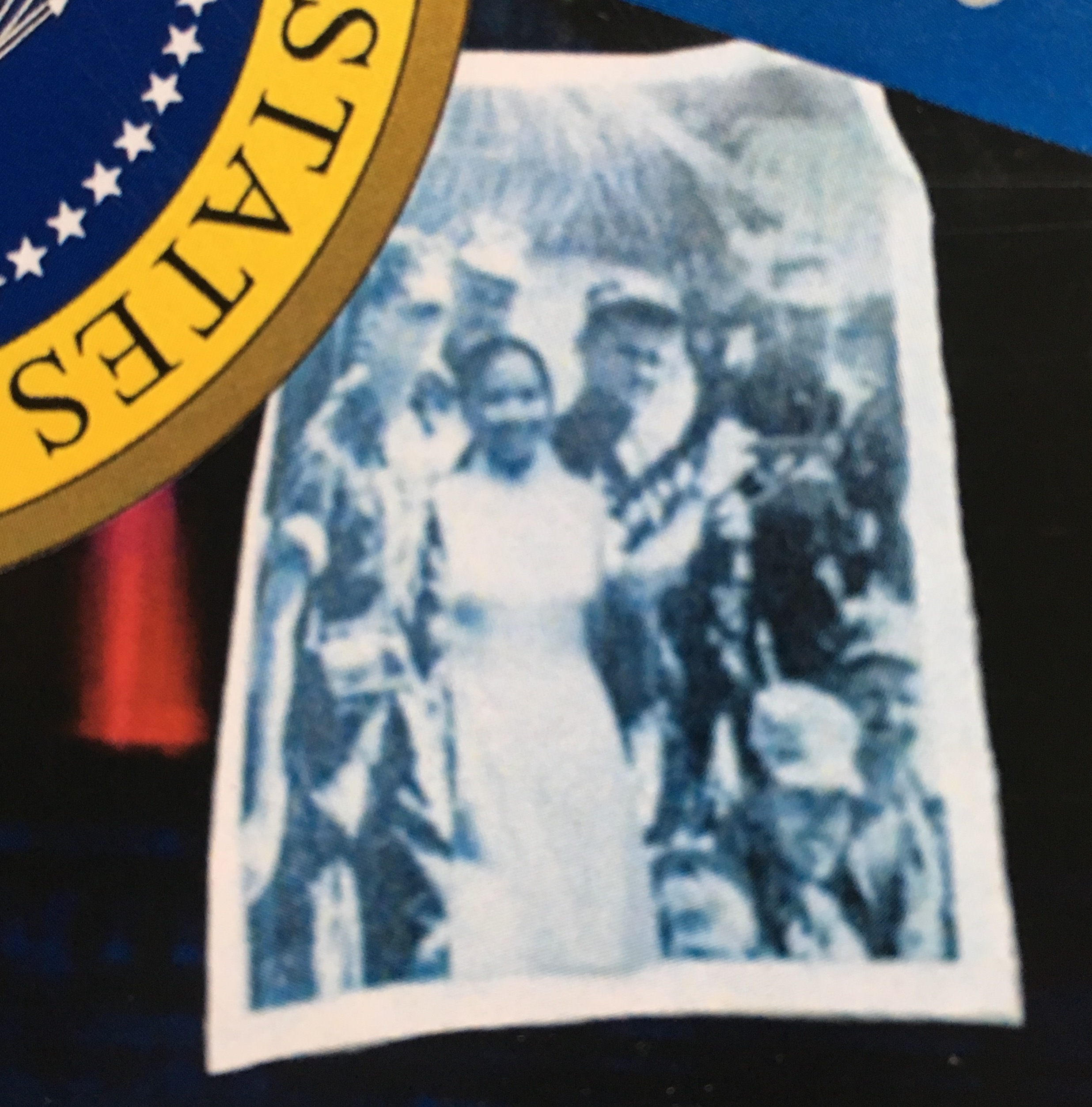 “He gaped at the tattered photograph that had just been slipped into his hand. His heart raced, and Senator Matt Steele, Democratic candidate for president, halted so abruptly his Secret Service agent bumped into him.” I was following the prescription, doing my best to grab the reader’s attention and throw them into the fray from the very first words. But no one has any idea where Matt Steele is, who he is, what he believes in, what he stands for. All we know here is that someone gave him a photograph that has caused some kind of alarm. I’m hoping, of course, that whoever picked that book up and opened it to the first page is going to be so instantly drawn into the story that they will buy my book. “He gaped at the tattered photograph that had just been slipped into his hand. His heart raced, and Senator Matt Steele, Democratic candidate for president, halted so abruptly his Secret Service agent bumped into him.” I was following the prescription, doing my best to grab the reader’s attention and throw them into the fray from the very first words. But no one has any idea where Matt Steele is, who he is, what he believes in, what he stands for. All we know here is that someone gave him a photograph that has caused some kind of alarm. I’m hoping, of course, that whoever picked that book up and opened it to the first page is going to be so instantly drawn into the story that they will buy my book.
But now think back to some of the best books you ever read that were published say 50 years ago or more. The ones that have stayed strong in your memory and probably still reside on your bookshelf. Did they begin with a bang, throwing you, the reader, and the protagonist into harm’s way in the first paragraph? Not so much.
 One of my all time favorite novels, High Tide at Noon was first published before I was even born. The copy on my shelf has frail pages that I turn reverently and every time I am drawn back into that world. It begins like this: One of my all time favorite novels, High Tide at Noon was first published before I was even born. The copy on my shelf has frail pages that I turn reverently and every time I am drawn back into that world. It begins like this:
“The Island lay very still under the clear golden light of a mid-summer noon. The whole world was bathed in a windless silence, steeped in warmth. Yet the air, alive with a peculiar clarity, had a sparkling edge.
Here in the great bay the sea held a blue that shook the heart, but the sky laid hold on you in a different way. The islands rose from one blueness and touched another, and in the glowing light they shone white and creamy and tawny and red, crested darkly with spruce. On the farthest northern horizon the mountains billowed along the sky in richly tender curves, grape-blue with distance. It was a day to drink like wine, and feel its intoxication seep through your heart and soul.
The dragger was incongruously dingy and loud in all this brilliant silence. Bound for fertile grounds far to the east, if had swerved from its course to enter the harbor. It was such a quiet harbor that when the engine stopped, and the boat slid noiselessly toward the wharf, the silence beat against the woman’s eardrums. Or was it her heart that hammered so?”
(Copyright: Elizabeth Ogilvie 1944)
I wonder if that book would make it past the acquiring editor’s desk today. But think of the picture it paints. The reader can close their eyes and “feel” like they are there in this place and time. If they have been there, they recognize it instantly. If it’s a place they’ve never been they can begin to imagine it before the action starts. Before the protagonist wonders if the pulsing feeling is all around her or inside her.
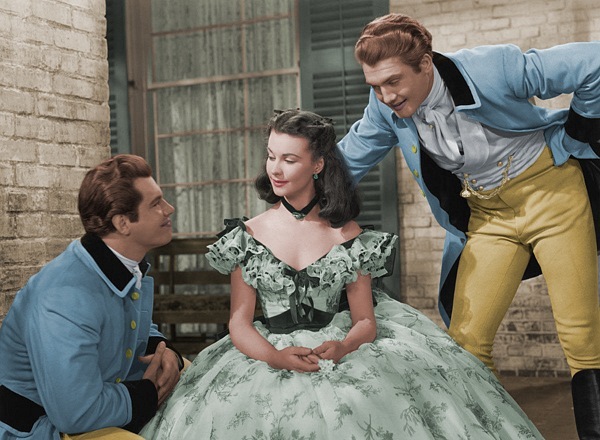 The same might be said of the opening to Gone With the Wind – where we are treated to an entire chapter being introduced to Scarlett sitting on a porch with two handsome rascals and getting a feel for their world, the era and the ambiance before we discover at the beginning of chapter two that Scarlett is devastated by the news that Ashley is marrying someone else. Even when that book first came out in 1936 our world was far removed from the world of Scarlett O’Hara, but in that first chapter we are introduced to her world, her life and her experience, the ambiance of Tara and the old south and even the hint of war on the horizon. Would we want it any other way? The same might be said of the opening to Gone With the Wind – where we are treated to an entire chapter being introduced to Scarlett sitting on a porch with two handsome rascals and getting a feel for their world, the era and the ambiance before we discover at the beginning of chapter two that Scarlett is devastated by the news that Ashley is marrying someone else. Even when that book first came out in 1936 our world was far removed from the world of Scarlett O’Hara, but in that first chapter we are introduced to her world, her life and her experience, the ambiance of Tara and the old south and even the hint of war on the horizon. Would we want it any other way?
A lot of the books I enjoy are action adventure and involve men and women who are skilled in worlds I will never begin to know. The more I read, the more I become familiar with the tactics, the weapons, the ways of communicating, electronically, in dialog and by hand signals, the terrain of far away places, and the grueling training they are subjected to before they end up on these types of teams. But that feel for their world is gained not just through the book I’m currently reading, but all those I read before it. I wonder if I would have come to an appreciation for the lives and dedication of these men and women sooner had the first book I read begun more like Gone With the Wind with an introduction to their world of dedication and hard charging daring do? Maybe not, I am living in a world of sound bytes like everyone else, but who knows.
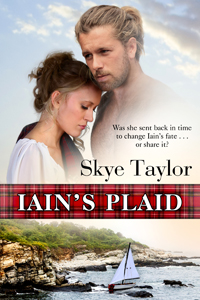 So, is there a happy medium between throwing the reader’s heart into overdrive in the first paragraph and taking an entire chapter to introduce them to a world they’ve never been in before? My current editor thinks there is. When I submitted my book Iain’s Plaid (Due out on June 2nd) to her she asked me to consider writing a prologue. I’d been so intent on that heart-pounding start, putting my heroine into harm’s way on that first page that I’d left the introduction to her world to be filtered in later on, bit by bit. Since I am traditionally published, I wrote that prologue for my editor and she was pleased. And now that it’s part of the book, I like it, too. I like that my reader knows what makes my heroine tick before I throw her under the bus, so to speak. My reader knows right from the beginning why she’s come to this unusual place where the tale begins and what she hopes to find. So, is there a happy medium between throwing the reader’s heart into overdrive in the first paragraph and taking an entire chapter to introduce them to a world they’ve never been in before? My current editor thinks there is. When I submitted my book Iain’s Plaid (Due out on June 2nd) to her she asked me to consider writing a prologue. I’d been so intent on that heart-pounding start, putting my heroine into harm’s way on that first page that I’d left the introduction to her world to be filtered in later on, bit by bit. Since I am traditionally published, I wrote that prologue for my editor and she was pleased. And now that it’s part of the book, I like it, too. I like that my reader knows what makes my heroine tick before I throw her under the bus, so to speak. My reader knows right from the beginning why she’s come to this unusual place where the tale begins and what she hopes to find.
I don’t really have an answer to this question. But I will offer this: If a tale is well written, and the characters compelling, the story will captivate the reader however it begins. So, my advice to readers is to spend less time worrying about a hook in the first sentence and more time crafting a story that will stay in your readers heart and imagination long after they’ve put it down, because if they were captivated, they will tell others and that first sentence won’t be so all consumingly important.
But I'm just one author - check out what all these great authors have to say...
A.J. Maguire
Dr. Bob Rich
Anne Stenhouse
Helena Fairfax
Marci Baun
Victoria Chatham
Rachael Kosinski
Rhobin Courtright
Connie Vines
Beverly Bateman
Tuesday, May 09 2017
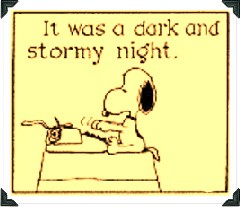 One of the things I most looked forward to when I retired was the freedom to write whenever I wanted to, or all day when the muse was with me. At one point in my working career, I’d been laid off during one of those slumps where so many lost their jobs, and I spend months haunting job fairs and unemployment offices. I made sure I had the requisite number of interviews to keep the unemployment checks coming, and send out many résumés each week, but mostly I wrote. It was the first chance I’d had to just dig in and write with no competing demands for my time. My husband had passed away and my youngest child was in college. Only my dog wanted my attention now and then. I completely immersed myself in my characters’ journeys. I lived, ate and breathed their lives and loves. From the moment I got out of bed in the morning until I got back in at night. Eventually I did land a job and it was back to the 9-5 rat race, dancing to someone else’s piper every day. Don’t get me wrong, I had a wonderful boss and an interesting job. But my day didn’t seem to give me much in the way of writing time. One of the things I most looked forward to when I retired was the freedom to write whenever I wanted to, or all day when the muse was with me. At one point in my working career, I’d been laid off during one of those slumps where so many lost their jobs, and I spend months haunting job fairs and unemployment offices. I made sure I had the requisite number of interviews to keep the unemployment checks coming, and send out many résumés each week, but mostly I wrote. It was the first chance I’d had to just dig in and write with no competing demands for my time. My husband had passed away and my youngest child was in college. Only my dog wanted my attention now and then. I completely immersed myself in my characters’ journeys. I lived, ate and breathed their lives and loves. From the moment I got out of bed in the morning until I got back in at night. Eventually I did land a job and it was back to the 9-5 rat race, dancing to someone else’s piper every day. Don’t get me wrong, I had a wonderful boss and an interesting job. But my day didn’t seem to give me much in the way of writing time.
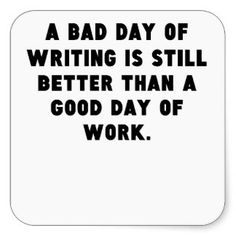 I’d get up early, eat breakfast, go for a walk, shower, dress and leave for work – my commute was about an hour long. Work 8 hours, sometimes a bit longer, grab a bite to eat in the middle and return home, another hour at the end of the day. My pooch, naturally wanted another walk and some playtime. He’d been alone all day while I was away. Even if I never turned the television on, it would be 8:00pm before I got to sit down at my computer. Then it would take another half hour to check email and respond. Then I’d open my manuscript and stare at the place I’d left off the night before. And stare. And stare. My mind a blank. So, I’d go back and read the last chapter written to get myself back into the story. Just when things started rolling, it would be time for bed. I had an alarm clock I’d be getting up to in just a few hours. I know lots of authors who do this every day, but it wasn’t working for me. I did get a couple novels written during this time, but it wasn’t the same lovely, all-consuming focus I’d had while I was laid off. Had I sold a best seller during that ten-month hiatus, I’d have had it made. Or so I told myself. That, of course, is a pipe dream. Rarely do writers hit it big enough on their first try to quit their day job. So, now my focus was on my retirement. I was getting close to that magic number. I just needed to hang on. I’d get up early, eat breakfast, go for a walk, shower, dress and leave for work – my commute was about an hour long. Work 8 hours, sometimes a bit longer, grab a bite to eat in the middle and return home, another hour at the end of the day. My pooch, naturally wanted another walk and some playtime. He’d been alone all day while I was away. Even if I never turned the television on, it would be 8:00pm before I got to sit down at my computer. Then it would take another half hour to check email and respond. Then I’d open my manuscript and stare at the place I’d left off the night before. And stare. And stare. My mind a blank. So, I’d go back and read the last chapter written to get myself back into the story. Just when things started rolling, it would be time for bed. I had an alarm clock I’d be getting up to in just a few hours. I know lots of authors who do this every day, but it wasn’t working for me. I did get a couple novels written during this time, but it wasn’t the same lovely, all-consuming focus I’d had while I was laid off. Had I sold a best seller during that ten-month hiatus, I’d have had it made. Or so I told myself. That, of course, is a pipe dream. Rarely do writers hit it big enough on their first try to quit their day job. So, now my focus was on my retirement. I was getting close to that magic number. I just needed to hang on.
And then the day came.
 But something else happened while I was waiting for the magic life of freedom to return. Social media, instant access to endless forms of tech stuff from games to research, photos of cute animals, political forums and pleas to support good causes, email, text messaging, smart phones (to keep you attached to this time consuming umbilical cord even when you are away from your desk) and so much more. Now I wake every morning with this song in my head that I have ALL DAY to write. I go about the needed tasks: walking the dog, starting a load of laundry, picking up a few things at the grocery store, mopping the floor, etc., with this urgent anticipation in my heart. TODAY I am going to write sooooo much. It’s going to be a great day. From time to time I glance at the clock so conveniently provided in the corner of my computer screen and I am always shocked by how late it is. My goodness! It’s almost lunchtime. Where did my morning go? Well, I might as well have lunch and walk the dog. Then I can sit down with my book and really get into it. But something else happened while I was waiting for the magic life of freedom to return. Social media, instant access to endless forms of tech stuff from games to research, photos of cute animals, political forums and pleas to support good causes, email, text messaging, smart phones (to keep you attached to this time consuming umbilical cord even when you are away from your desk) and so much more. Now I wake every morning with this song in my head that I have ALL DAY to write. I go about the needed tasks: walking the dog, starting a load of laundry, picking up a few things at the grocery store, mopping the floor, etc., with this urgent anticipation in my heart. TODAY I am going to write sooooo much. It’s going to be a great day. From time to time I glance at the clock so conveniently provided in the corner of my computer screen and I am always shocked by how late it is. My goodness! It’s almost lunchtime. Where did my morning go? Well, I might as well have lunch and walk the dog. Then I can sit down with my book and really get into it.
The other thing that has finally become clear to me is that those months of my hiatus from work when I lived in my current novel in progress (I wrote four 100,000 word books in ten months, albeit, rough drafts needing much editing) those months were a thing of the past. I sometimes wonder if I actually cut myself off from the internet and went on a sabbatical to the top of some mountain with no people or even my dog around to distract me, would I be able to find my way back to that time? But, of course, I’m not going into seclusion. Among other things, I did become a published author which means I have to spend a certain amount of my time promoting the books I already have out there, which means spending time interacting with my readers in one way or another.
 I’ve come to the conclusion that my best writing time, regardless of when I get up, or what the day includes, is from 4:00 to 8:00 pm. I’ve also gone back to wake my computer up at midnight or even later and write for another hour or two. I have always been a night owl and not a morning person so perhaps that makes sense. I’ve come to terms with it. I try not to be disappointed that so much of my promising day has gotten away from me before I finally get into my writing. I enjoy my characters and I thank them for sharing their lives with me whenever they find time. I enjoy my neighbors who wave when they pass by or stop to chat for a bit. I relish the time I spend on the beach with my dog and I love going out to lunch with fellow authors and comparing notes. So, maybe it’s not that wild and crazy ride I was on during the months I was laid off, but it’s a good life. I’ve got a new book coming out early next month and I’m in the revision stage for another with an urgent idea forming in my brain for two more. I’m blessed. I’ve come to the conclusion that my best writing time, regardless of when I get up, or what the day includes, is from 4:00 to 8:00 pm. I’ve also gone back to wake my computer up at midnight or even later and write for another hour or two. I have always been a night owl and not a morning person so perhaps that makes sense. I’ve come to terms with it. I try not to be disappointed that so much of my promising day has gotten away from me before I finally get into my writing. I enjoy my characters and I thank them for sharing their lives with me whenever they find time. I enjoy my neighbors who wave when they pass by or stop to chat for a bit. I relish the time I spend on the beach with my dog and I love going out to lunch with fellow authors and comparing notes. So, maybe it’s not that wild and crazy ride I was on during the months I was laid off, but it’s a good life. I’ve got a new book coming out early next month and I’m in the revision stage for another with an urgent idea forming in my brain for two more. I’m blessed.
Saturday, April 22 2017
 April Round Robin topic is suggested by Victoria Chatham: Reviews. Love 'em, hate 'em or totally ignore them. Amazon tells us the more 4 or 5 reviews the merrier, but how to get them? April Round Robin topic is suggested by Victoria Chatham: Reviews. Love 'em, hate 'em or totally ignore them. Amazon tells us the more 4 or 5 reviews the merrier, but how to get them?
To review or not to review – that is the question! I find it odd when another writer tells me they never read reviews. Really? I always read them. Maybe not ALL of them but I do read them for a lot of reasons.
 As a reader, I read reviews to get an idea if this is a book I really want to spend my time and money on. One thing that really irks me in this day of self publishing is authors who throw the book out there thinking grammar and spell check is good enough and fail to get the book properly edited. Maybe if I wasn’t a writer myself it wouldn’t bother me so much but a book full of misspellings and improper grammar drives me nuts and I can’t get past it. So a couple reviews that mention this problem is a definite NO for me to bother downloading. But other comments about the type of story, the depth of characters, or even just a description of characters might make up my mind for me. For instance, I love stories about military people, but hate stories about millionaires and beauty queens. I grabbed up a book on sale that happened to be set in the area I grew up in – just because I knew all the places and it sounded fun. Turned out to be a fantastic book and I can’t wait for the next one by this new author. As a reader, I read reviews to get an idea if this is a book I really want to spend my time and money on. One thing that really irks me in this day of self publishing is authors who throw the book out there thinking grammar and spell check is good enough and fail to get the book properly edited. Maybe if I wasn’t a writer myself it wouldn’t bother me so much but a book full of misspellings and improper grammar drives me nuts and I can’t get past it. So a couple reviews that mention this problem is a definite NO for me to bother downloading. But other comments about the type of story, the depth of characters, or even just a description of characters might make up my mind for me. For instance, I love stories about military people, but hate stories about millionaires and beauty queens. I grabbed up a book on sale that happened to be set in the area I grew up in – just because I knew all the places and it sounded fun. Turned out to be a fantastic book and I can’t wait for the next one by this new author.
 As an author, I read my own reviews. Partly because patting myself on the back requires uncomfortable contortions, but more because I learn from the reviews. If I let myself be open about the critical comments it can only help me grow as an author to avoid those pitfalls in my future books. Likewise, when reviewer after reviewer has the same or similar positive comments, I know what I’m getting right. I don’t write books for the benefit of critiquers and editors, but for my readers and reading my reviews helps me to know and understand what my readers liked and didn’t like and work harder to meet their expectations with each new book I write. As an author, I read my own reviews. Partly because patting myself on the back requires uncomfortable contortions, but more because I learn from the reviews. If I let myself be open about the critical comments it can only help me grow as an author to avoid those pitfalls in my future books. Likewise, when reviewer after reviewer has the same or similar positive comments, I know what I’m getting right. I don’t write books for the benefit of critiquers and editors, but for my readers and reading my reviews helps me to know and understand what my readers liked and didn’t like and work harder to meet their expectations with each new book I write.
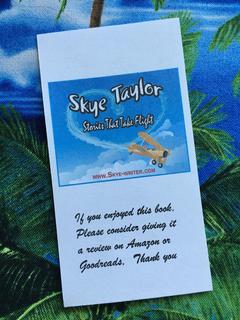
As for GETTING reviews – that’s the tough question. I’ve had readers who write me gushing emails telling me how much they loved my book, but when I ask for a review tell me they don’t know how to write one. I’ve been known to suggest they copy and past the email they just sent. I have four kids who love my stories, three of them daughters who read the kind of books I write anyway. But one of them says she just “doesn’t do reviews!” Not even for good old MOM! I’ve run contests offering a drawing from all the names who write me a review. I always ask for a review when someone tells me they loved my book. One other thing I did was to create a bookmarker with my logo on it and the comment that if they enjoyed this book please consider writing me a review. I put one in every print version of my book that I sell, both at book signings and in books on consignment at local bookstores. I slip them into books at B&N for the length of time my books show up on their shelves as well. But on the whole I find trying to get reviews is difficult. Now I’m going to check out all the other visits to this Round Robin blog to see what other ideas I can try.
 Marci Baun Marci Baun
Dr. Bob Rich
Beverley Bateman
Helena Fairfax
Rachael Kosinski
A.J. Maguire
Margaret Fieland
Connie Vines
Rhobin Courtright
Tuesday, April 11 2017

On Facebook for the past couple weeks, we’ve seen a mixture of spring images and unexpected snow. Daffodils blooming in spite of the chill, and trees everywhere beginning to bud. Spring is coming even when winter seems reluctant to leave. And this seems to be true of our lives as well. In some places and in some arenas people cling to the past. But the one thing we cannot do is hold time still. Accepting the changes that come with spring: warmer weather, sunshine, flowers, and a fresh new beginning in nature aught to help us to see that change is not always to be feared and avoided. One can’t step through a new door until one closes the one behind you.
 Think of all the new beginnings you’ve faced in your lives – some welcome, some joyous, some scary. That first day of kindergarten or nursery school – the day you had to let go of the familiarity of home and meet a whole classroom full of new faces and a new routine. Although my friends today would probably never have guessed it, I clung to my mother’s legs begging her not to leave me. But where would I have been in life, had she not gone and I had not begun my formal education? Leaving for college is another sometimes scary, sometimes eagerly anticipated event. Our first really foray into the world as adults was empowering even while it presented new chances to fail and get hurt. Getting married is nearly always a joyful event. We are in love and excited to become a new little family, leaving the shelter of the one we grew up in. But even here, there are new things to learn and overcome to make marriage and life a success. Every new job we’ve ever embarked on, however fervently sought, had its learning curve, brought its own new challenges and sometimes even failures before we took hold and made the position our own. Having a child changes everything about your life. Now you are totally responsible for another person, one helplessly relying on you for their survival, but once accepted and the challenges faced, parenthood can be one of the greatest achievements in life and bring the greatest of joy and love. Think of all the new beginnings you’ve faced in your lives – some welcome, some joyous, some scary. That first day of kindergarten or nursery school – the day you had to let go of the familiarity of home and meet a whole classroom full of new faces and a new routine. Although my friends today would probably never have guessed it, I clung to my mother’s legs begging her not to leave me. But where would I have been in life, had she not gone and I had not begun my formal education? Leaving for college is another sometimes scary, sometimes eagerly anticipated event. Our first really foray into the world as adults was empowering even while it presented new chances to fail and get hurt. Getting married is nearly always a joyful event. We are in love and excited to become a new little family, leaving the shelter of the one we grew up in. But even here, there are new things to learn and overcome to make marriage and life a success. Every new job we’ve ever embarked on, however fervently sought, had its learning curve, brought its own new challenges and sometimes even failures before we took hold and made the position our own. Having a child changes everything about your life. Now you are totally responsible for another person, one helplessly relying on you for their survival, but once accepted and the challenges faced, parenthood can be one of the greatest achievements in life and bring the greatest of joy and love.
 Just growing older doesn’t stop the inevitable changes that life can throw at us. Retirement, aging, failing bodies, loss of friends, loss of the ability to do the things we once did with ease are all changes that we must face. To cling to what cannot remain just keeps us from finding pleasure and joy in what we now have. Just growing older doesn’t stop the inevitable changes that life can throw at us. Retirement, aging, failing bodies, loss of friends, loss of the ability to do the things we once did with ease are all changes that we must face. To cling to what cannot remain just keeps us from finding pleasure and joy in what we now have.
I probably don’t have to urge any of you to welcome Spring and anticipate summer, but I’d like you to take a moment and welcome some of the other changes that have come into our lives over the past few months and make the most of them. Instead of weeping for what has passed, embrace what is and give the best that you have in you to make it good.
From Ecclesiastes 3
“For everything there is a season, and a time for every purpose under heaven: a time to be born, and a time to die; a time to plant, and a time to reap; a time to kill, and a time to heal; a time to break down, and a time to build up; a time to weep, and a time to laugh; a time to mourn, and a time to dance; a time to seek, and a time to lose; a time to keep, and a time to cast away; a time to love, and a time to hate; a time for war, and a time for peace.”
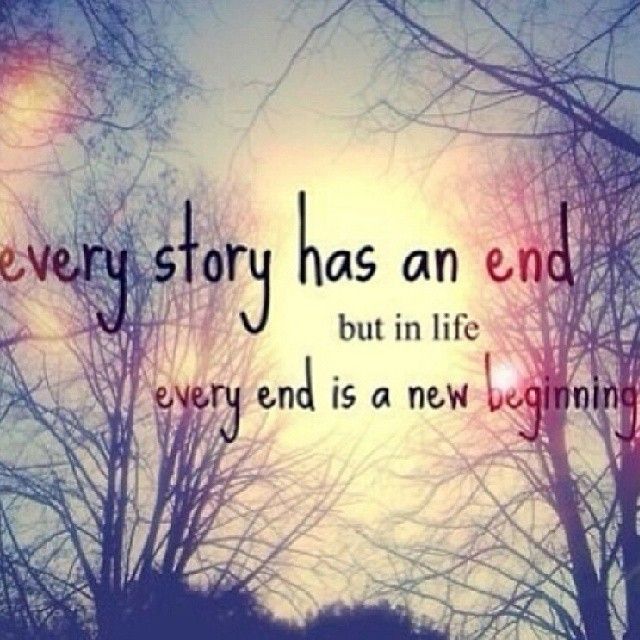
Friday, March 17 2017
March Round Robin topic is: Are you ever emotionally drained by writing certain scenes, and how real are your characters to you?
 As a reader, I remember one scene, actually a chapter, that I was listening to on audio in the car on my way to a meeting. It was an action/adventure thriller – a genre filled with angst and tension. When I got to my destination, I turned off the car and headed into the building with this intense feeling that I was late and needed to hurry. But when I got there, I was actually early. At first having no idea why I was feeling this intense need to get there. Only as the adrenalin rush wore off, did I realize I’d been so drawn into the immediacy of the story that I was feeling all the same anxious pressure the characters were feeling in a life or death situation. All I could think was WOW! That was great writing. As a reader, I remember one scene, actually a chapter, that I was listening to on audio in the car on my way to a meeting. It was an action/adventure thriller – a genre filled with angst and tension. When I got to my destination, I turned off the car and headed into the building with this intense feeling that I was late and needed to hurry. But when I got there, I was actually early. At first having no idea why I was feeling this intense need to get there. Only as the adrenalin rush wore off, did I realize I’d been so drawn into the immediacy of the story that I was feeling all the same anxious pressure the characters were feeling in a life or death situation. All I could think was WOW! That was great writing.
As an author, I can only hope I can bring my readers to that kind of a precipice when they’re reading my books. I don’t write Action/Adventure, though, so my scenes aren’t going to leave my readers coming down from an adrenalin rush. As a pantser, I tend to write character driven stories, and since most of them are romance, there have been scenes that leave me drained emotionally. Some romance scenes: falling in love, making love, happy ever afters etc aren’t usually emotionally draining so much as leaving an emotional high. Either you have a wonderful world view that grows out of a satisfying romantic connection or you’re hunting for your mate and hoping you can get them as aroused as you are. But the scenes in romance that tend to leave me drained are the “Black Moments.” That crisis moment in the story when everything seems lost and your characters, and you, the author are going to get your heart broken.
.
 In the most recent release in my Cameron’s of Tide’s Way series, my hero finds out something he feels the heroine should have told him herself, years ago, and he’s hurt and disappointed. What he started out as a conversation to find out what happened and why she hadn’t told him turns into an angry scene as his anger overcomes the hurt and any chance the heroine has to make her case. When she finally storms off, it seems like all is lost. When I finished writing that scene, I was emotionally drained and just as hurt as my hero, AND just as crushed as my heroine. I had to collect my dog and go for a walk on the beach while my emotions ebbed and the physical reactions calmed. I was surprised at the time because I hadn’t felt that bad when they said good bye all those years ago, even knowing what was going to happen to them. So, YES, there are scenes that leave me totally, emotionally drained. In the most recent release in my Cameron’s of Tide’s Way series, my hero finds out something he feels the heroine should have told him herself, years ago, and he’s hurt and disappointed. What he started out as a conversation to find out what happened and why she hadn’t told him turns into an angry scene as his anger overcomes the hurt and any chance the heroine has to make her case. When she finally storms off, it seems like all is lost. When I finished writing that scene, I was emotionally drained and just as hurt as my hero, AND just as crushed as my heroine. I had to collect my dog and go for a walk on the beach while my emotions ebbed and the physical reactions calmed. I was surprised at the time because I hadn’t felt that bad when they said good bye all those years ago, even knowing what was going to happen to them. So, YES, there are scenes that leave me totally, emotionally drained.
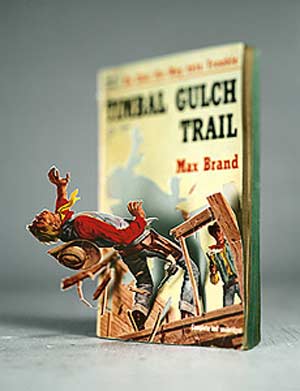 My characters are very real to me. My stories are character driven so I spend a lot of time before the book even starts creating my characters, writing their backstory, learning who they are, what they like and what they hate, their favorite music and hobbies, their strengths and their faults. I know that motivates them and I know the dark things they try to hide from the world. I know what makes them vulnerable. SO, when the story finally gets underway, most of the time I never have to ask what they’d do next because I already know how they are going to react. But sometimes they surprise me. I created them and yet suddenly I find myself typing something about them I had no idea of before. Sometimes I have a plan for their story arc, and they plant their feet and defy me. They have other plans. I usually go with the flow and let them have their way. Other times I let them have their say and then we return to the plot I had in mind. My characters are very real to me. My stories are character driven so I spend a lot of time before the book even starts creating my characters, writing their backstory, learning who they are, what they like and what they hate, their favorite music and hobbies, their strengths and their faults. I know that motivates them and I know the dark things they try to hide from the world. I know what makes them vulnerable. SO, when the story finally gets underway, most of the time I never have to ask what they’d do next because I already know how they are going to react. But sometimes they surprise me. I created them and yet suddenly I find myself typing something about them I had no idea of before. Sometimes I have a plan for their story arc, and they plant their feet and defy me. They have other plans. I usually go with the flow and let them have their way. Other times I let them have their say and then we return to the plot I had in mind.
My characters are so real, I find myself sharing what’s happening to them with others, mostly other writers, but occasionally a friend or family member or even a reader. I talk about them as if they were real and the problems they are facing are real. Just like I would talk about something that happened to me, or to someone I know. My writer friends understand. My other acquaintances look at me as if I’m losing it.
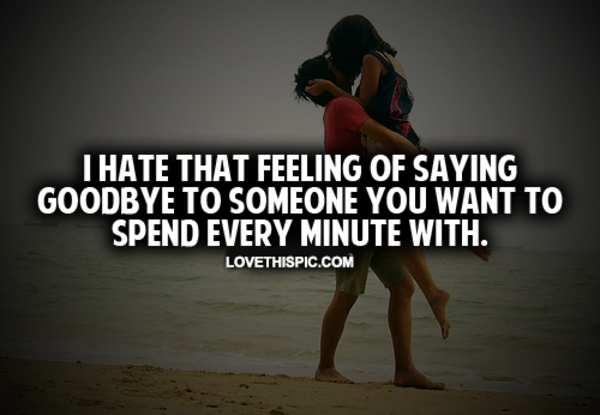 But the time I know without a doubt that my characters have become real to me is when I write The End. Even on the first draft when I still have lots of editing and revising to do. I have this lost feeling like my best friend just up and moved to the other side of the country. I might email them or call them from time to time, but it will never be the same as it was while I was writing their story and they were living in my head. I know the story now, I know how it ends and they are leaving me. I miss them terribly until I begin the next book and find new friends to invest so much emotional capital in. I have a new sweatshirt that boasts in large letters across the chest: I am an author. That means I am creative, cool, passionate . . . and a little crazy. And maybe having people I’ve made up out of thin air become that real to me is a little crazy, but if it is, then I’m perfectly happy with crazy. But the time I know without a doubt that my characters have become real to me is when I write The End. Even on the first draft when I still have lots of editing and revising to do. I have this lost feeling like my best friend just up and moved to the other side of the country. I might email them or call them from time to time, but it will never be the same as it was while I was writing their story and they were living in my head. I know the story now, I know how it ends and they are leaving me. I miss them terribly until I begin the next book and find new friends to invest so much emotional capital in. I have a new sweatshirt that boasts in large letters across the chest: I am an author. That means I am creative, cool, passionate . . . and a little crazy. And maybe having people I’ve made up out of thin air become that real to me is a little crazy, but if it is, then I’m perfectly happy with crazy.
Want to know what other authors think?
Victoria Chatham
 Marci Baun Marci Baun
Margaret Fieland
Judith Copek
A.J. Maguire
Connie Vines
Rachael Kosinski
Dr. Bob Rich
Heather Haven
Beverley Bateman
Kay Sisk
Diane Bator
Helena Fairfax
Rhobin Courtright
Tuesday, March 14 2017
 I belong to a large and beautiful Catholic church, but during Lent I am always drawn to participating in the Way of the Cross services at a tiny little church a half hour west of me. They hold it in the garden beside the church (weather permitting which it nearly always does) at noon. People of all ages take part, right down to toddlers more interested in exploring and school age children who take turns saying the prayers. Instead of rushing from one station to another mumbling the words so fast one can’t really even follow them, never mind contemplate the meaning, the pace is slow with time and space to think and reflect. As I was leaving the lovely service this past Friday, I got to remembering the most vividly intense Way of the Cross I ever joined. I belong to a large and beautiful Catholic church, but during Lent I am always drawn to participating in the Way of the Cross services at a tiny little church a half hour west of me. They hold it in the garden beside the church (weather permitting which it nearly always does) at noon. People of all ages take part, right down to toddlers more interested in exploring and school age children who take turns saying the prayers. Instead of rushing from one station to another mumbling the words so fast one can’t really even follow them, never mind contemplate the meaning, the pace is slow with time and space to think and reflect. As I was leaving the lovely service this past Friday, I got to remembering the most vividly intense Way of the Cross I ever joined.
.
 I’d been in Tonga for more than a year and had experienced the spiritual depth of prayer both in and out of the church. But the Way of the Cross was special. Dressed in mourning clothes, which is black garb and traditional woven mats wrapped about the waist, I headed downtown to St Joseph’s Cathedral in Neiafu. There the procession winds from the church steps, around the streets of the small town, stopping fourteen times to offer prayer. A young man dressed as Christ carries a very large and heavy cross and it is obvious early on that the work is hard. He is sweating and his steps grow more weary after each stop, until we finally return to the steps of the church where he is tied to that cross and the cross lifted up. There were no nails, of course, but a tiny chock beneath his heels. As the prayers went on, his limbs began to tremble and his face was contorted with the effort to remain where he was. Looking at that young, earnest face, it was so easy to picture Christ upon his cross, trembling with fatigue, thirsting and finally calling out for his Father do to His will. For the rest of my life, that young face will color my interpretation of the Way of the Cross, and encourage me when I balk at carrying my own cross. I’d been in Tonga for more than a year and had experienced the spiritual depth of prayer both in and out of the church. But the Way of the Cross was special. Dressed in mourning clothes, which is black garb and traditional woven mats wrapped about the waist, I headed downtown to St Joseph’s Cathedral in Neiafu. There the procession winds from the church steps, around the streets of the small town, stopping fourteen times to offer prayer. A young man dressed as Christ carries a very large and heavy cross and it is obvious early on that the work is hard. He is sweating and his steps grow more weary after each stop, until we finally return to the steps of the church where he is tied to that cross and the cross lifted up. There were no nails, of course, but a tiny chock beneath his heels. As the prayers went on, his limbs began to tremble and his face was contorted with the effort to remain where he was. Looking at that young, earnest face, it was so easy to picture Christ upon his cross, trembling with fatigue, thirsting and finally calling out for his Father do to His will. For the rest of my life, that young face will color my interpretation of the Way of the Cross, and encourage me when I balk at carrying my own cross.
  
Tuesday, February 28 2017
 It’s human nature to become comfortable with what we know and what we surround ourselves with. My mom, bless her, never wanted anything to change. As a kid growing up that used to frustrate me. I was eager to explore new places and do new things. I’ve never really outgrown that, but I’ve begun to appreciate where my mother was coming from, too. I especially feel that way about technology. I was born long before computers were even created, never mind becoming an important part of all our lives. So, technology is a challenge for me. My husband bought our first Apple computer. At work I learned to use MS DOS – God help me, if I had to go back to that blank blue screen and remember all the commands I’d need to make something appear now, I’d be lost. So, maybe Windows was a good thing for all the complaining folk did. And, since I operate on a Mac, I love OS X and the endless menus. We no longer have to memorize the commands. We can just fish around reading menus until what we are looking for appears. But I still find myself groaning when an app on my phone gets updated and something I knew how to do disappears. Then I have to learn all over again. It’s human nature to become comfortable with what we know and what we surround ourselves with. My mom, bless her, never wanted anything to change. As a kid growing up that used to frustrate me. I was eager to explore new places and do new things. I’ve never really outgrown that, but I’ve begun to appreciate where my mother was coming from, too. I especially feel that way about technology. I was born long before computers were even created, never mind becoming an important part of all our lives. So, technology is a challenge for me. My husband bought our first Apple computer. At work I learned to use MS DOS – God help me, if I had to go back to that blank blue screen and remember all the commands I’d need to make something appear now, I’d be lost. So, maybe Windows was a good thing for all the complaining folk did. And, since I operate on a Mac, I love OS X and the endless menus. We no longer have to memorize the commands. We can just fish around reading menus until what we are looking for appears. But I still find myself groaning when an app on my phone gets updated and something I knew how to do disappears. Then I have to learn all over again.
 But just as the constant changes in technology bring good things along with the challenges, so does the world around us. When Eisenhower’s new Interstate Highway system got underway there was a lot of grumbling about the land the government had to take back, and then there was learning how to use it. My grandfather never did absorb the need to get up to speed on the entrance ramp and scared the bejeezus out of me when he stopped before entering the highway. But once we altered our behavior, and our expectations, the system became a part of our environment we now take for granted. All 47,000 plus miles of it. We like our little town just the way it’s always been, why do we need a parking garage? But once it’s built we wonder how we ever coped with hunting for illusive curbside spots. But just as the constant changes in technology bring good things along with the challenges, so does the world around us. When Eisenhower’s new Interstate Highway system got underway there was a lot of grumbling about the land the government had to take back, and then there was learning how to use it. My grandfather never did absorb the need to get up to speed on the entrance ramp and scared the bejeezus out of me when he stopped before entering the highway. But once we altered our behavior, and our expectations, the system became a part of our environment we now take for granted. All 47,000 plus miles of it. We like our little town just the way it’s always been, why do we need a parking garage? But once it’s built we wonder how we ever coped with hunting for illusive curbside spots.
 I moved into my little bungalow by the sea here in St Augustine just a month after back to back nor’easters pummeled the dunes on our beach. The waves breached the dunes and pushed into the Summerhaven river. Once breached more sand was pushed into the river on every high tide, eventually clogging the river. Wading birds and fish went elsewhere. Kayaking and oyster harvesting ceased. That change was not welcomed by those who’d lived here for years and they spent the next several years lobbying to have the river rehabilitated and the dunes rebuilt. They were up against the crew that felt Mother Nature should be left alone to do what she wants. No matter who won that argument, someone was not going to be happy. In the meantime, new to the area, I just enjoyed being able to walk onto the beach every day. Well, the restore-the-river folk won in the end and now it’s changing all over again. I moved into my little bungalow by the sea here in St Augustine just a month after back to back nor’easters pummeled the dunes on our beach. The waves breached the dunes and pushed into the Summerhaven river. Once breached more sand was pushed into the river on every high tide, eventually clogging the river. Wading birds and fish went elsewhere. Kayaking and oyster harvesting ceased. That change was not welcomed by those who’d lived here for years and they spent the next several years lobbying to have the river rehabilitated and the dunes rebuilt. They were up against the crew that felt Mother Nature should be left alone to do what she wants. No matter who won that argument, someone was not going to be happy. In the meantime, new to the area, I just enjoyed being able to walk onto the beach every day. Well, the restore-the-river folk won in the end and now it’s changing all over again.

The dunes are growing again and every day it’s a new challenge to figure out how to get onto the beach. I have no idea what it will look like when they’re done. Maybe that access to the beach will disappear. Scrambling down over high dunes is pretty easy, but climbing back up might be impossible. A man I only ever knew as John used to ride his bike down to the little cove and perch on the rocks above the beach to read. I’m not sure where he’d sit today as that beach is now ten feet under the new dune. I’m sure the ocean itself will have a lot to say about the final disposition of all those tons of sand, but like it or not, change is happening.


But I’ve decided to welcome the change. Not that I can stop it, but let’s be positive. At the moment, some enterprising folks salvaged some of the flotsam from Hurricane Matthew and built a new stairway with a railing at the other end of my road. I can always visit the beach there – at least until the next big storm moves those rocks and destroys the stairway. So, just like being willing to try out a smart phone and discovering it’s the best little gadget I’ve ever owned, perhaps the new access to the beach over the dunes will turn out to be awesome, too.
I had grown comfortable with the way it was before, but I just might love the changes even better. So, unlike my mom, I’m going to welcome changes in my life and rise to the challenge. After all, don’t they claim that challenging yourself is a way to keep your brain young?
Saturday, February 18 2017
The Round Robin topic for February: Description. What is your saturation point? What is not enough? How do you decide what to include and when to hold back to allow the reader to fill in the blanks? Do you ever skim description when reading a book? If so, what description are you most likely to skip?
Wow! This is an interesting topic and I can’t wait to read all these other authors’ take on the subject. It’s a hard question to answer, not just here for this Round Robin Blog, but every time I write a book.
 Just the right amount of description puts you right there in the scene, feeling the soft breeze of a moonlit night on the beach or the damp chill of a winter rain, hearing the rattle of keys dropped on a glass topped table, or the startling rustle of something unexpected moving behind you, smelling the choking pall of heavy smoke, or the enticing whiff of man’s cologne. Details are important for setting the scene and the mood. They also give the reader their first mental image of a character. Well used, they tell more than a character’s physical appearance or beauty. A man might have the physique of someone who worked and played hard. Or a woman might be the kind that turns a man’s head, but demands a no-nonsense attitude. I like that kind of description because it tells me more about the character than the details of their physical appearance and allows me to flesh them out to suit my vision of how they should look. A good story needs descriptive narrative otherwise it would come across like a police report. Consider the difference between ‘He picked up the phone and called her.’ With ‘His hand hovered over the receiver. He really didn’t want to talk to her just now. He sighed and picked up the phone.’ Obviously a lot more words, but also a lot more information than just the simple action of calling someone on the phone. Description can be packed into dialog as well. As in “get your clammy hands off me.” or “What’s not to like? She’s soft in all the right places and very willing.” And in action: If he scrambled down the embankment and into the culvert soaking his shoes, you know he wasn’t walking casually and there was water in the culvert without it actually being said. But description can be overdone, as well. Just the right amount of description puts you right there in the scene, feeling the soft breeze of a moonlit night on the beach or the damp chill of a winter rain, hearing the rattle of keys dropped on a glass topped table, or the startling rustle of something unexpected moving behind you, smelling the choking pall of heavy smoke, or the enticing whiff of man’s cologne. Details are important for setting the scene and the mood. They also give the reader their first mental image of a character. Well used, they tell more than a character’s physical appearance or beauty. A man might have the physique of someone who worked and played hard. Or a woman might be the kind that turns a man’s head, but demands a no-nonsense attitude. I like that kind of description because it tells me more about the character than the details of their physical appearance and allows me to flesh them out to suit my vision of how they should look. A good story needs descriptive narrative otherwise it would come across like a police report. Consider the difference between ‘He picked up the phone and called her.’ With ‘His hand hovered over the receiver. He really didn’t want to talk to her just now. He sighed and picked up the phone.’ Obviously a lot more words, but also a lot more information than just the simple action of calling someone on the phone. Description can be packed into dialog as well. As in “get your clammy hands off me.” or “What’s not to like? She’s soft in all the right places and very willing.” And in action: If he scrambled down the embankment and into the culvert soaking his shoes, you know he wasn’t walking casually and there was water in the culvert without it actually being said. But description can be overdone, as well.
 Once upon a time, I read a lot of Regency Romance, but as much as I loved the era, I got tired of reading detailed descriptions of how the heroine was dressed. I had no need to know if the dress had three flounces around the hem, or an apron of creamy satin or what kind of lace graced the neckline. Nor did I want a detailed outline of the hero’s smallclothes and that he was a master at tying a waterfall cravat. Perhaps that’s a key component of that genre – if so, that’s probably why I’ve stopped reading them. And I confess to skipping descriptive narrative that’s either too much or seems irrelevant. Years ago, when Outlander first came out, I devoured the book, read it several times, including all the descriptive stuff. But with each succeeding book, Diana Gabaldon has gone into more elaborate detail about things that have no impact on the plot or the characters. By book three I was skipping whole sections of her endless detail. By book five I stopped reading them at all, and that’s saying something for a reader who fell completely in love with Jamie Fraser and couldn’t get enough at the start. Once upon a time, I read a lot of Regency Romance, but as much as I loved the era, I got tired of reading detailed descriptions of how the heroine was dressed. I had no need to know if the dress had three flounces around the hem, or an apron of creamy satin or what kind of lace graced the neckline. Nor did I want a detailed outline of the hero’s smallclothes and that he was a master at tying a waterfall cravat. Perhaps that’s a key component of that genre – if so, that’s probably why I’ve stopped reading them. And I confess to skipping descriptive narrative that’s either too much or seems irrelevant. Years ago, when Outlander first came out, I devoured the book, read it several times, including all the descriptive stuff. But with each succeeding book, Diana Gabaldon has gone into more elaborate detail about things that have no impact on the plot or the characters. By book three I was skipping whole sections of her endless detail. By book five I stopped reading them at all, and that’s saying something for a reader who fell completely in love with Jamie Fraser and couldn’t get enough at the start.
I still enjoy romance – who doesn’t love a good love story! But today I read a far wider variety of genres, including action, adventure and stories with a patriotic or military theme. But even here, my eyes begin to glaze over when the author, either because they are in love with the paraphernalia, or because they’ve done a ton of research and just can’t bear to leave out any of the details they’ve so carefully researched. I want the story – the action – the characters either doing or surviving. I’d like to know they are adequately armed and have the latest in technology, that they are savvy about using the internet, or not, if they are well trained and physically fit, but I don’t need the minutiae. Consider Randy Wayne Wright’s Doc Ford series. We all know Ford was once a covert operator and now he’s a marine biologist, but Wright doesn’t bore me with detailed descriptions of the things Ford does in his lab or in endless backstory about his shadowy past. He just fills the pages with colorful characters, a setting that makes me want to go to Sanibel and tells an engaging story that draws the reader in.
 I think there are some details the reader does need to know. It might be important that a man is wearing cargo shorts rather than a suit or a uniform. Adding that they are faded and frayed might say something else about the character or the situation. If a character is wearing all black, including a balaclava that also tells you something about what he might be up to. And a heroine with 4 inch heels and a briefcase paints a definite picture. If the hero is in a gunfight, knowing he’s only got a handgun with an 8 round magazine and the villain is armed with an AK-47 that definitely sets the scene and puts the reader on the edge of their seat. But do we have to read the sales brochure or the military procurement description of the gun to get that picture? Or know where the heroine shops? Likewise, if a detective is entering a building that might have clues, a hostage, or a bad guy, details like suspicious noises, loss of electric power, too many places to hide, or shadows sets a compelling scene, but you don’t have to be offered a detailed floor plan or a lengthy discussion on the reason for the power outage. So, like I said, it’s a balancing act. How much to include, how much to leave out? I think there are some details the reader does need to know. It might be important that a man is wearing cargo shorts rather than a suit or a uniform. Adding that they are faded and frayed might say something else about the character or the situation. If a character is wearing all black, including a balaclava that also tells you something about what he might be up to. And a heroine with 4 inch heels and a briefcase paints a definite picture. If the hero is in a gunfight, knowing he’s only got a handgun with an 8 round magazine and the villain is armed with an AK-47 that definitely sets the scene and puts the reader on the edge of their seat. But do we have to read the sales brochure or the military procurement description of the gun to get that picture? Or know where the heroine shops? Likewise, if a detective is entering a building that might have clues, a hostage, or a bad guy, details like suspicious noises, loss of electric power, too many places to hide, or shadows sets a compelling scene, but you don’t have to be offered a detailed floor plan or a lengthy discussion on the reason for the power outage. So, like I said, it’s a balancing act. How much to include, how much to leave out?
 As an author, I sometimes leave out important details. I might assume a general knowledge of things that the average person perhaps does not have. Or I know my character’s backstory so well and in my eagerness to get to the action, I forget there are details of that backstory the reader needs to know to understand the character’s motivation. My upcoming release, Iain’s Plaid, is set during the months leading up to the start of the Revolutionary War. I admit it’s one of my favorite periods in American History, and I know a lot more about it than most people do, but I’m still surprised to discover that the only thing from that moment in history that most people are aware of is the Boston Tea Party, or the vague notion that it was all about taxes. My editor, God bless her, pointed out to me all the places her lack of knowledge left her wondering why my hero was doing what he was doing. Or what was going on historically. I had to find ways to weave that knowledge into the story without it sounding like a history lesson. As an author, I sometimes leave out important details. I might assume a general knowledge of things that the average person perhaps does not have. Or I know my character’s backstory so well and in my eagerness to get to the action, I forget there are details of that backstory the reader needs to know to understand the character’s motivation. My upcoming release, Iain’s Plaid, is set during the months leading up to the start of the Revolutionary War. I admit it’s one of my favorite periods in American History, and I know a lot more about it than most people do, but I’m still surprised to discover that the only thing from that moment in history that most people are aware of is the Boston Tea Party, or the vague notion that it was all about taxes. My editor, God bless her, pointed out to me all the places her lack of knowledge left her wondering why my hero was doing what he was doing. Or what was going on historically. I had to find ways to weave that knowledge into the story without it sounding like a history lesson.
Sometimes leaving out detailed description allows the reader to imagine the world in their own mind. Whatever things an individual reader might feel is heroic or compelling can be attributed to the hero or heroine of the story if they aren’t described in intimate detail, and the reader will be naturally partial to him or her just because of that very personal bias. There are some characteristics that are critical to the story, or the motivations behind the hero or heroine’s actions, but a lot of other stuff can be left to the readers’ imaginations. The same goes for the worlds they live in. Include the details that drive the story or impact the outcome, leave out the stuff that doesn’t influence the story or the characters in any meaningful way. Often those details are things the author likes but the story doesn’t really need.
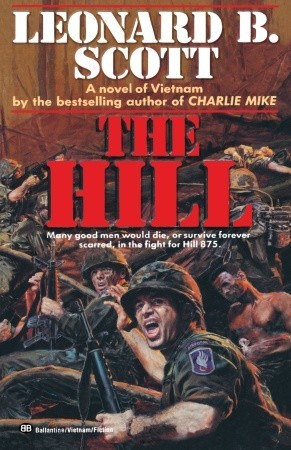 It also depends on what effect the author is going for. Leonard B. Scott wrote a book called The Hill. Set during the Vietnam War, his hero was a native American who had grown up loving the hills of his birth and Scott lets you into that love and respect before he drops the hero into the chaos of war and puts him on a hill that the US Army is determined to take regardless of the cost. But the added drama for that story was the Vietnamese general who loved the hill of his birthland. The very hill the Americans were determined to take. A hill the Viet Cong had riddled with tunnels and defenses. Seeing that battle from both points of view added a whole other layer of suspense and tragedy. The way that story was told let the reader into the hearts and souls of men from both sides of that bitter struggle and had a very different impact than had one only seen it from the American’s point of view. Sometimes an author wants the reader to be as surprised by the actions of the antagonist as the protagonist is, so you won’t know those details from the other side of the story. Personally, I think it adds to the suspense if you know something the protagonist doesn’t know, but the Perry Mason stories and the Sherlock Holmes mysteries are classic examples of the reader being as much in the dark as everyone else in the story other than Mason and Holmes until the final reveal. And those stories are classics. It also depends on what effect the author is going for. Leonard B. Scott wrote a book called The Hill. Set during the Vietnam War, his hero was a native American who had grown up loving the hills of his birth and Scott lets you into that love and respect before he drops the hero into the chaos of war and puts him on a hill that the US Army is determined to take regardless of the cost. But the added drama for that story was the Vietnamese general who loved the hill of his birthland. The very hill the Americans were determined to take. A hill the Viet Cong had riddled with tunnels and defenses. Seeing that battle from both points of view added a whole other layer of suspense and tragedy. The way that story was told let the reader into the hearts and souls of men from both sides of that bitter struggle and had a very different impact than had one only seen it from the American’s point of view. Sometimes an author wants the reader to be as surprised by the actions of the antagonist as the protagonist is, so you won’t know those details from the other side of the story. Personally, I think it adds to the suspense if you know something the protagonist doesn’t know, but the Perry Mason stories and the Sherlock Holmes mysteries are classic examples of the reader being as much in the dark as everyone else in the story other than Mason and Holmes until the final reveal. And those stories are classics.
I guess the bottom line for authors is to understand the impact you want your story to have, then find skillful ways of including the details that must be there to create that effect, while avoiding info dump and long narrative passages of back story that the reader doesn’t need to know and might get bored with. One axiom of writing I’ve heard a lot regarding whose point of view to be in is, “who has the most to lose?” That’s because being inside the head of the character with the most to lose gives the reader a chance to know more details about the stakes. An author needs to keep that in mind when deciding what descriptive information to include and what to leave out. What are the stakes? If the reader doesn’t know this detail, will it change his expectations? Conversely, if this detail makes no difference to the outcome, why is it there in the first place? If Diana Gabaldon had asked herself that question and realized it was just her fascination with all that deep research that compelled her to include way too much detail and kept her books to 300 or 400 pages instead of a thousand, I might still be reading her books.
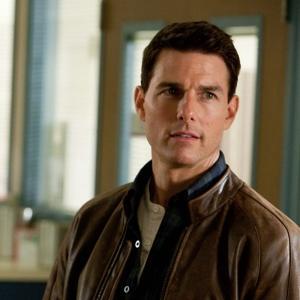 Which leads to my last observation for authors. KNOW YOUR READERS. Obviously given Gabaldon’s over the top success, most of her readers either love that kind of detail or are willing to bear with her. W.E.B. Griffin’s readers are similarly enthralled with his endless recital about arms, procedure, backstory and places. On the other side of the road are those who prefer the straight-forward Jack Reacher. It doesn’t get much simpler than carrying a toothbrush in his pocket and having no home or cell phone. Lee Child includes just enough detail about Jack so I knew the caliber of the man, his stature and military background, but the rest was up to my imagination as the plots unfolded, and when Tom Cruise was cast as Reacher for the movies, I was appalled. Arrogant, short and self-centered, Cruise couldn’t possibly live up to the larger-than-life man I had imbedded in my psyche. I probably would have been equally appalled if John Wayne had been cast as James Bond, but then, Ian Flemming had already endowed Bond with a fairly well fleshed out description. Which leads to my last observation for authors. KNOW YOUR READERS. Obviously given Gabaldon’s over the top success, most of her readers either love that kind of detail or are willing to bear with her. W.E.B. Griffin’s readers are similarly enthralled with his endless recital about arms, procedure, backstory and places. On the other side of the road are those who prefer the straight-forward Jack Reacher. It doesn’t get much simpler than carrying a toothbrush in his pocket and having no home or cell phone. Lee Child includes just enough detail about Jack so I knew the caliber of the man, his stature and military background, but the rest was up to my imagination as the plots unfolded, and when Tom Cruise was cast as Reacher for the movies, I was appalled. Arrogant, short and self-centered, Cruise couldn’t possibly live up to the larger-than-life man I had imbedded in my psyche. I probably would have been equally appalled if John Wayne had been cast as James Bond, but then, Ian Flemming had already endowed Bond with a fairly well fleshed out description.
So, now that you’ve borne with my ramblings on the topic, hop on over and check out what these authors have to say on the subject.
 Marci Baun http://www.marcibaun.com/blog/ Marci Baun http://www.marcibaun.com/blog/
Beverley Bateman http://beverleybateman.blogspot.ca/
Anne Stenhouse http://annestenhousenovelist.wordpress.com/
Dr. Bob Rich https://bobrich18.wordpress.com/2017/02/18/description
A.J. Maguire http://ajmaguire.wordpress.com/
Rachael Kosinski http://rachaelkosinski.weebly.com/
Diane Bator http://dbator.blogspot.ca/
Rhobin Courtright http://www.rhobinleecourtright.com
Wednesday, February 08 2017

Have Americans always been this uncivil to each other over the subject of politics?
In 2016 as the candidates began jockeying for supremacy within their own parties and laying the foundation for future attacks on the other party, Washington Post pundit, Dana Milbank, attributed the ugliness to the growing polarization of both parties. But then he added that the Republican Party had gone bonkers, throwing yet more fuel on the flames of partisan politics. When was the last time any of us had a civil conversation about how our government works or doesn’t with someone whose views are different than our own?
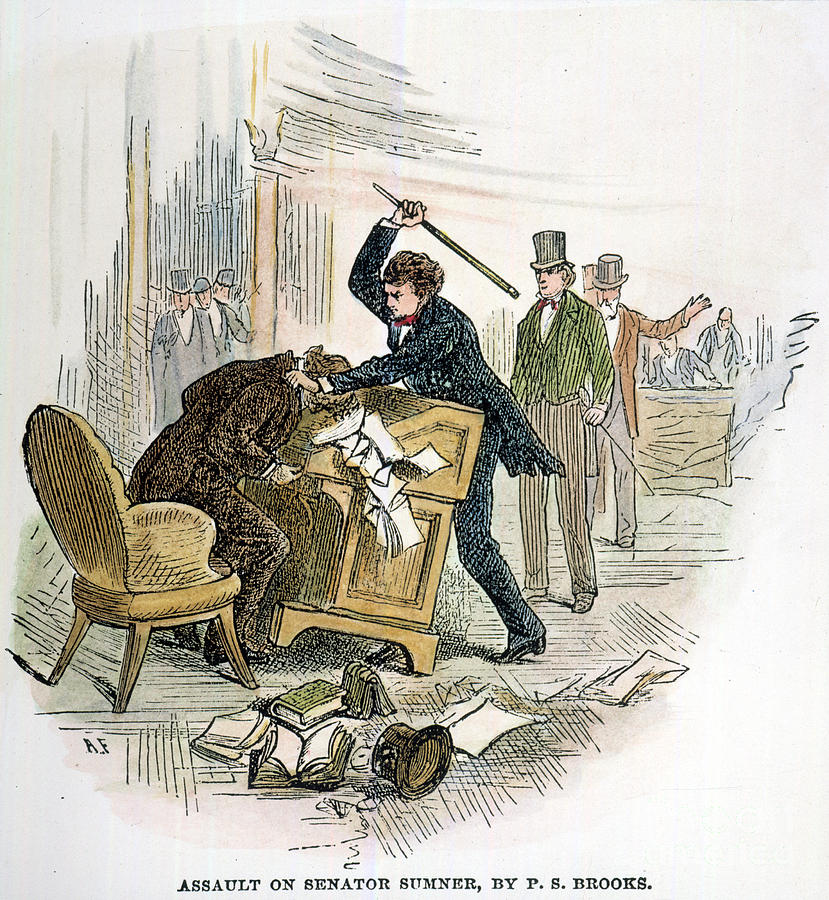 History seems refute the idea that today’s incivility is anything new or even that it has grown worse. In ancient Greece where democracy was born, politicians were rough, insulting and vulgar, including degrading sexual attacks. In the early days of our own democracy, as George Washington prepared to step down, opposing factions began their attacks in much the same manner. John Adams was referred to by opposing parties as “His Rotundity” mocking both his girth and his alleged aristocratic pretensions. The Federalists responded by calling the other party “a horrible sink of treason,” or an “odious conclave of tumult.” Surely more flowery language than we use today, but no less insulting and hateful. In the years leading up to the Civil War, Abraham Lincoln was referred to as “the Missing Link.” But then the incivility became physical when Representative, Preston Brooks beat Senator Charles Sumner on the Senate floor so severely with a cane that it took three years for Sumner to fully recover. While Hillary Clinton and Donald Trump did not strike each other physically, the same cannot be said for their followers. Especially after the unexpected result of the election sent Clinton’s followers into the streets under the guise of protest to riot, beat and loot. History seems refute the idea that today’s incivility is anything new or even that it has grown worse. In ancient Greece where democracy was born, politicians were rough, insulting and vulgar, including degrading sexual attacks. In the early days of our own democracy, as George Washington prepared to step down, opposing factions began their attacks in much the same manner. John Adams was referred to by opposing parties as “His Rotundity” mocking both his girth and his alleged aristocratic pretensions. The Federalists responded by calling the other party “a horrible sink of treason,” or an “odious conclave of tumult.” Surely more flowery language than we use today, but no less insulting and hateful. In the years leading up to the Civil War, Abraham Lincoln was referred to as “the Missing Link.” But then the incivility became physical when Representative, Preston Brooks beat Senator Charles Sumner on the Senate floor so severely with a cane that it took three years for Sumner to fully recover. While Hillary Clinton and Donald Trump did not strike each other physically, the same cannot be said for their followers. Especially after the unexpected result of the election sent Clinton’s followers into the streets under the guise of protest to riot, beat and loot.
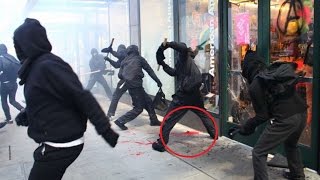 But those who stayed at home, dealing with either shock or elation continued to swamp social media with outrageous rants, facts blown all out of proportion and accusations that were not even facts to start with. And just when the angry rhetoric began to subside Donald Trump was inaugurated and it began all over again. Where, many of us begin to wonder, will this incivility end? And what is to become of our “melting pot” society? The Great American Ideal? But those who stayed at home, dealing with either shock or elation continued to swamp social media with outrageous rants, facts blown all out of proportion and accusations that were not even facts to start with. And just when the angry rhetoric began to subside Donald Trump was inaugurated and it began all over again. Where, many of us begin to wonder, will this incivility end? And what is to become of our “melting pot” society? The Great American Ideal?
Perhaps we should take some solace that our forefathers would not have been as surprised at today’s discourse as we might think. As James Madison wrote in Federalist 10, “citizens are motivated not by the rational study of ideas, empirical evidence, and cool debate over the issues, but by “interests and passions. Out of these arise the conflicting “factions” and “parties,” each seeking to protect and advance its interests, and all “inflamed . . . with mutual animosity, and rendered . . . much more disposed to vex and oppress each other, than to co-operate for their common good.” So perhaps this is the nature of democratic politics and to be expected and allowed.
 But then we turned our attention to sports, especially to the upcoming Super Bowl 51. For me, I have my favorite teams that I enjoy cheering for, but it’s still just a game. National security and peoples lives don’t hang in the balance so I try to just enjoy the game. Apparently there are those who take winning and losing more seriously. I am a fan of the New England Patriots – after all, I grew up in New England. And I am not a fan of Roger Goodell who seems to enjoy making power plays, fair or not, while overlooking some really bad behavior on the part of some in the sport and serious problems like head injuries. So I was looking forward to watching my team win and a man I disliked having to shake Brady’s hand and make nice. But the Falcons played a great game. A truly great game. Young but talented, they dominated the first 2/3s of the game and it wasn’t looking good for my team. I didn’t lose faith, though. It’s not wise to underestimate Tom Brady until the last minute of the game has ticked away and he came through. Against all predictions and the talking heads, he has made Super Bowl history in more ways than just how many rings he now wears. But then we turned our attention to sports, especially to the upcoming Super Bowl 51. For me, I have my favorite teams that I enjoy cheering for, but it’s still just a game. National security and peoples lives don’t hang in the balance so I try to just enjoy the game. Apparently there are those who take winning and losing more seriously. I am a fan of the New England Patriots – after all, I grew up in New England. And I am not a fan of Roger Goodell who seems to enjoy making power plays, fair or not, while overlooking some really bad behavior on the part of some in the sport and serious problems like head injuries. So I was looking forward to watching my team win and a man I disliked having to shake Brady’s hand and make nice. But the Falcons played a great game. A truly great game. Young but talented, they dominated the first 2/3s of the game and it wasn’t looking good for my team. I didn’t lose faith, though. It’s not wise to underestimate Tom Brady until the last minute of the game has ticked away and he came through. Against all predictions and the talking heads, he has made Super Bowl history in more ways than just how many rings he now wears.
 The Patriots happen to be on top for now. The team is deep with talent and Tom Brady is the first to give credit for his success to the men he plays with and relies on. But their day will pass, just as the Dallas Cowboys supremacy did, just as The Bruins with Bobby Orr, or the Celtics with Larry Bird, and another team will shine. It might even be that young team from Atlanta. Imagine my dismay, on Monday morning. On pages dedicated to the Patriots for and by their fans, haters jumped in to spew their bitterness and spite. Are we supposed to bring this level of incivility to everything we do? Why can’t we applaud other’s successes and admire their talent instead of trying to destroy them? We all need a few heroes in our lives to inspire us. Knocking them down seems so unproductive and unnecessary. I turned off Facebook after the election, but I never thought I’d feel like doing so just because the Patriots won another Super Bowl. The Patriots happen to be on top for now. The team is deep with talent and Tom Brady is the first to give credit for his success to the men he plays with and relies on. But their day will pass, just as the Dallas Cowboys supremacy did, just as The Bruins with Bobby Orr, or the Celtics with Larry Bird, and another team will shine. It might even be that young team from Atlanta. Imagine my dismay, on Monday morning. On pages dedicated to the Patriots for and by their fans, haters jumped in to spew their bitterness and spite. Are we supposed to bring this level of incivility to everything we do? Why can’t we applaud other’s successes and admire their talent instead of trying to destroy them? We all need a few heroes in our lives to inspire us. Knocking them down seems so unproductive and unnecessary. I turned off Facebook after the election, but I never thought I’d feel like doing so just because the Patriots won another Super Bowl.
|